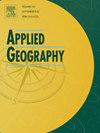多维旅游因素如何影响社区恢复力?
IF 4
2区 地球科学
Q1 GEOGRAPHY
引用次数: 0
摘要
越来越多的人根据灾害带来的不确定性来评估社区的复原力。虽然早期的研究主要集中在社区层面的因素,如平均收入和教育水平,但最近的研究强调了个人观念和行业贡献在塑造社区复原力方面的重要性。基于先前关于旅游对社区恢复力的空间多样性影响的讨论,本研究探讨了旅游中个人和行业层面的因素如何在时间和区域上促进社区恢复力。利用地理加权回归,我们研究了2015年和2020年佛罗里达州和更广泛的美国旅游依赖社区的旅游因素对社区恢复力的空间异质性影响。值得注意的是,与全国趋势相反,佛罗里达州的过度旅游拥堵与社区恢复力的下降无关,即使个人对气候变化的认识很高。这表明,除非直接解决游客涌入等问题,否则仅提高对气候变化的认识可能是不够的。我们的研究结果强调了社区恢复力的多维性,推进了恢复力理论,并为旨在提高社区恢复力的本地化策略提供了实践见解,特别是在依赖旅游业的社区。本文章由计算机程序翻译,如有差异,请以英文原文为准。
How do multidimensional tourism factors affect community resilience?
Community resilience is increasingly evaluated in light of growing uncertainties posed by disasters. While earlier research primarily focused on community-level factors, such as average income and education levels, recent studies have highlighted the importance of individual perceptions and industry contributions in shaping community resilience. Based on earlier discussions on the spatially diverse impacts of tourism on community resilience, this study investigates how individual- and industry-level factors in tourism contribute to community resilience over time and across regions. Using geographically weighted regression, we examined the spatially heterogeneous impacts of tourism factors on community resilience in tourism-dependent communities in Florida and the broader United States for 2015 and 2020. Notably, in contrast to national trends, excessive tourist congestion in Florida was not associated with a decline in community resilience, even when individual awareness of climate change was high. This indicates that raising awareness of climate change alone may be insufficient unless issues like tourist influx are directly addressed. Our findings emphasize the multidimensional nature of community resilience, advancing resilience theory and providing practical insights for localized strategies aimed at enhancing community resilience, particularly in tourism-dependent communities.
求助全文
通过发布文献求助,成功后即可免费获取论文全文。
去求助
来源期刊

Applied Geography
GEOGRAPHY-
CiteScore
8.00
自引率
2.00%
发文量
134
期刊介绍:
Applied Geography is a journal devoted to the publication of research which utilizes geographic approaches (human, physical, nature-society and GIScience) to resolve human problems that have a spatial dimension. These problems may be related to the assessment, management and allocation of the world physical and/or human resources. The underlying rationale of the journal is that only through a clear understanding of the relevant societal, physical, and coupled natural-humans systems can we resolve such problems. Papers are invited on any theme involving the application of geographical theory and methodology in the resolution of human problems.
 求助内容:
求助内容: 应助结果提醒方式:
应助结果提醒方式:


